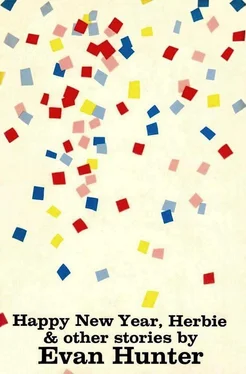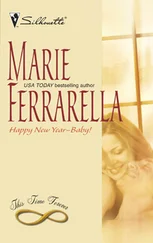The house was very still.
He stood in the center of the wood-paneled den, alone in the house, the ceiling lights glinting on the sleek, polished barrel of the gun. His face in the shining barrel was eerily reflected, distorted by the curve of the metal and shimmer of the overhead fixture. The gun was light in his hands. It had a checkered walnut stock, with a full pistol grip. The barrel was plain and round, but it was made of a special alloy steel so that, even though it was a twelve-gauge gun, it felt as light as any twenty-gauge he’d ever handled. It was really ironic, he thought, that Beth was the one who’d insisted on buying the gun, over his protests. It was really so goddamn ironic that he felt like crying because... because this gun, this gun he held in his hands, was something more than a weapon or a deliverer. Its possession, his ownership of it even though he’d never wanted it, was an admission of a way of life. And his way of living had really left very little choice in determining the way of his dying.
How still the house was, almost as if it expected a sudden noise and were bracing itself for the shock. That’s ridiculous, he thought. The house is empty because Beth and the children are at the beach. No one expected me home this early, not on a Friday afternoon.
He looked at the gun again.
Well, he thought, I might as well get it over with. Shells, he thought. I suppose I’ll need shells.
Aimlessly, he began walking toward the garage. The shotgun felt a little heavier in his hands. He felt no real sense of urgency, and yet he knew the thing had to be done before Beth and the children got home. He supposed that would be around five o’clock, and it was only three now. It seemed much later than that. The idea had come to him at exactly two-thirty, just a half hour ago. He had said his final “Yes” at that time and then had glanced at his desk clock, as if wanting to mark the hour, as if knowing even as the “Yes” left his lips that it was the last time he would ever say that word, the last time he would allow himself to be talked into doing something he did not want to do.
He found the box of shells at the back of one of the drawers in the old chest stored in the garage. He went back into the house and loaded the gun to its full five-shot capacity, even though he knew he’d need only one shot, and then he sat with the gun across his lap for several moments and tried to think if there was anything he wanted to do before he killed himself. He had no idea as yet whether he would put the barrel of the gun in his mouth or simply hold it against his temple. The idea of killing himself did not frighten him. In fact, he accepted it with a sort of depressive calm, as if he had known from the very beginning, from that time so long ago when he had first said “Yes,” that this was the way it would end.
He decided to leave a note for Beth. He didn’t really care whether or not she understood, but he felt nonetheless that he should leave some sort of note. He had given her little enough in her lifetime, and he didn’t want her to think she was totally responsible for what he was going to do. Maybe she was partially responsible, but not entirely, and the least he could do for her was to leave a note to put her mind at ease.
He put the shotgun down on the floor alongside the desk, and he looked around in the desk drawer for a sheet of paper, closed the drawer, opened another one, reopened the first one, and found the pad right under his hand. He sharpened a pencil and then sat down in the desk chair and wondered what he could say to her and then thought, The hell with her, let her figure it out herself , and then relented, sighed, meticulously dated the top of the page, and wrote:
Dear Beth ,
I’m not sure you will understand this. I’m not sure I understand it myself. I only know...
I’m not sure I do understand it, he thought. I’m really not sure I understand it at all. I only know that when Alan came into my office and put the question to me, when Alan asked me to do whatever it was he asked — I can hardly remember what he asked; it is only with a great effort of will that I can remember him asking at all — and I said, “Yes, sure, yes,” I knew that was the end, I knew I had to do this.
He paused, holding the pencil poised over the pad, wondering how he could tell this to Beth. How do you explain to a woman you never loved the things that mean the most to you? How do you tell her about a boy who used to lie in bed beside a frost-rimmed window imagining a universe of ice-crystal stars stretching to eternity? How do you explain a boy who rolled up his trouser cuffs and waded in the river long before winter had released its grip, his toes numb, a foolish grin on his mouth? How do you explain the dreams of youth and the gradual disappearance of the dreams, of any dream, until there was nothing left but a vast compromise with something only vaguely remembered? Where does it go? he wondered. How do you get to be forty-two years old and writing a farewell note to a woman you never wanted?
How can you tell her about a night that happened before she even existed, a night that happened before the beginning of time, when the lights of the ferris wheel traced a round-robin pattern against a starless sky? The calliope music was flooding the vacant lot upon which the carnival had pitched its travel-worn brown tents. There was the noise of barkers, and the simulated, shrieking of young girls, and the mechanical roar of the amusement machines, and the tiny pop of the .22 in his hands, and the echoing sound of the bullets spanging against the gong at the far end of the gallery.
The girl was suddenly there.
He looked up as he reloaded the rifle, and the girl was there, and suddenly his hands were wet. She looked at him somewhat shyly, a tall girl of seventeen, with long blond hair and luminous brown eyes, a faint smile on her mouth. She was wearing a pale-blue cotton frock, and her legs were long and tanned, and she wore white sneakers dulled by the dust of the vacant lot. The night opened. The world dissolved. He looked at her, and everything he had ever wanted in all his long eighteen years was suddenly there, standing not three feet away from him. He put down the rifle. He looked at the girl soundlessly, and his eyes suddenly misted. And then, without expecting to, he held out his hand to her.
The girl looked at him curiously. She studied his face. She shook her head slightly and seemed about to speak, and then her eyes fastened to his, and the night narrowed into a single direct channel, the ferris wheel, the barkers, the terrified shrieks, the laughter, all melting beyond the fringes of focus, their eyes meeting and holding with an intensity so great it excluded all else. Speechless, she took his hand.
The carnival was a part of the dream. They walked through its tinsel and glitter like figures from another time, displaced. There was a glow of unreality to the night. The lights seemed softer now, the music indistinct, the laughter muffled and far away. Only the girl was real, and even the girl was part of the dream. She would not tell him her name. They made a game of it, he trying to guess, and she repeatedly shaking her head, her laughter rising to join the music of the calliope. He bought her a jelly apple, and he watched, bewitched, as her teeth sank into the thick candy crust, and he said, “Your name is Guinevere.”
“No.”
“Elaine then?”
“No.”
Her laughter. Walking with a gentle, delicate step, the dust-covered sneakers carrying her gracefully over the lot and then to the littered sidewalk beyond, and across the town to where the river snaked in unreflecting blackness, overhung with the willows on its bank. He held her hand and guided her to the water’s edge. The grass was wet with dew. He cupped her face in one hand and whispered, “Tell me your name.”
Читать дальше












